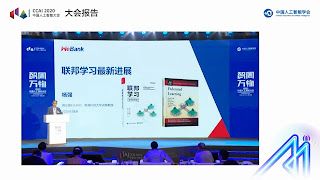The
6th Chinese Congress on Artificial Intelligence (CCAI2020) which was led by
Chinese Association for Artificial Intelligence (CAAI), was held on Aug 29-30,
2020, in Nanjing, China. Since COVID-19 affected globally, the Congress was run
both online and offline. The frame of congress named “Intellectual Know for Everything
(智周万物)”.
I was committee member of the CAAI Extenics Professional Committee (中國人工智能學會可拓學專業委員會) attended the congress online in
this time.
Day 2 (30 Aug 2020):
In
the beginning, Prof. Yang Qiang (杨强 - CAAI名誉副理事长,微众银行首席AI官) chaired the Morning session for keynotes.
The first speaker was Prof. Yolanda Gil (人工智能促进会现任主席,南加州大学信息科学研究所科研副主任) and her topic was “Thoughtful
Artificial Intelligence: Forging a New Partnership for Data Science and
Scientific Discovery”. Firstly, she briefed AI application had separated into
Data Thread and Knowledge Thread.
Prof. Gil discussed four main
points in this talk including Knowledge Technology, AI and its interdisciplinary
frontiers and Thought AI.
Then she mentioned the Thoughtful
AI using the photo of Freestyle Chess Champion Anson Williams and quoted Gary
Kasparov (2010) statement that “Weak human + machine + better process was
superior to a strong computer alone and, more remarkably, superior to a strong
human + machine + inferior process.” And
then she explained seven Thoughtful AI principles.
i)
Rationality Principle – From knowledge to behavior
ii)
Context Principle – Capture the purpose and significance of tasks
iii)
Initiative Principle – Self-driven learning from the scientific record
or through independent inquiry
iv)
Network Principle – Seek resources from a knowledge web of the
scientific record
v)
Articulation Principle – Communicating findings to different audiences
and respond but also ask and discuss.
vi)
Ethical Principle – Behavior that conveys awareness of scope and
limitations
vii)
Systems Principle – Compositionality, abstraction, connectivity
At the end, Prof. Yolanda Gil
gave conclusion on Thoughtful AI in the following four points:
i)
Knowledge technologies are increasing important.
ii)
AI offers systematic, correct, unbiased approaches and rigorous
reporting.
iii)
AI will excel at assembling fragmented knowledge about complex systems
and pursue interdisciplinary frontiers.
iv)
Thoughtful AI will exploit knowledge technologies for effective human-AI
partnerships.
The second speaker was Dr. Ming
Zhou (周明 - 微软亚洲研究院副院长) and his presentation was “Pre-trained
Models in Multi-Lingual and Multi-Modality Tasks” (预训练模型在多语言、多模态任务的进展).
Firstly, Dr. Zhou explained the
pre-trained model concept and its application such as for text, auto-encoding,
classification, question-answering … etc.
Then he explained why pre-trained models need as follows:
i)
Pre-trained models embed task-agnostic general knowledge.
ii)
Pre-trained models transfer learnt knowledge to downstream tasks.
iii)
Pre-trained models supports almost all NLP tasks with state-of-the-art
results.
iv)
Provide a scalable solution to various applications.
After that he briefed pre-trained
models in multi-lingual tasks and multi-modality tasks. And they got a good evaluation results.
Finally, Dr. Zhou summarized
their future works included pre-trained models in NN-NLP and explore new tasks,
model architectures and empowered with interpretation mechanisms to NN-NLP.


















































